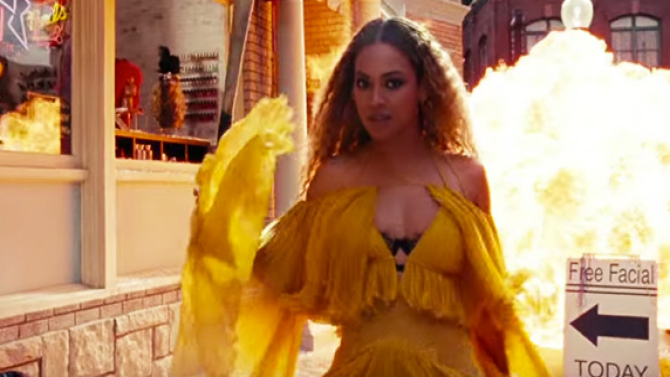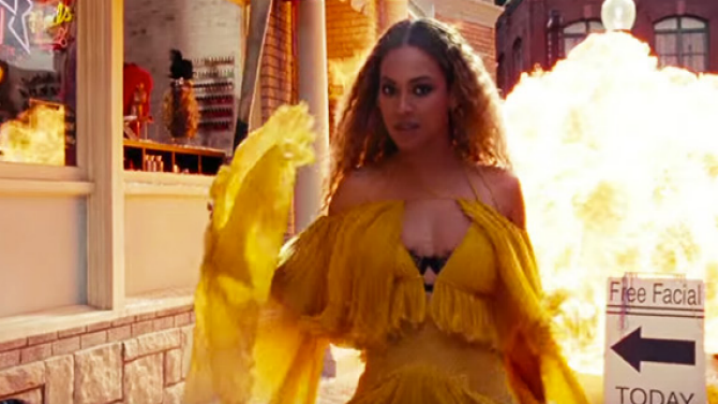[ad_1]

Scene from Beyonce’s Lemonade
YouTube.com
Well, if anyone could move the conversation away from the tragic death of Prince this weekend, it is Beyoncé, once a pop princess, now a fully grown Queen who dropped her 12-track visual album, Lemonade, on HBO last night (now available on Tidal).
And far from being a “cool refreshing drink,” Bey’s lemonade was a hot cauldron of fury.
It is also quite simply a stunning piece of art that touches on everything from heartbreaking betrayal, daddy issues, longing, loving and rage, set to soaring gothic images in which black women and girls play the center.
As soon as the epic event began, #Lemonade became the most searched term on Twitter but there was also a plethora of other terms attached to it that bubbled up including #BlackGirlMagic, #ToniMorrison, #MalcolmX, and #WarshanSire, whose lovely poetry spilled from Bey’s lips throughout.
Now let’s get to it—what was Lemonade saying?
Lots. And there will be lots to unpack by week’s end, but in essence, Beyoncé presented a burning, soarning love letter to herself and black women—our pain, our beauty, our hard love, our betrayal, our strength— exposing herself bare like we’ve never seen her before (and she cusses too!) Each song or scene is prefaced by an loose interpretation of the stages of grief: Intuition, Denial, Anger, Apathy, Emptiness, Accoutability, Reformation, Resurreciton, Hope and Redemption.
Honestly, if the music is to be interpreted literally, that is, if she was really singing about her relationship with her husband, Jay Z and his infidelity, I was almost embarrassed by the intimacy of it. I always knew that Beyoncé would bust out of that carefully curated shell one day, but the explosive and out of control way that she did it, the sheer emotion of it, was almost too much to bear.
But alas we soldier on through its beauty. Because first of all, the imagery was absolutely gorgeous. Bey used a plethora of noted directors including Khalil Joseph who directed Kendrick Lamar’s 15-minute long video, “m.A.A.d.”; Melina Matsoukas, who did “Formation”; Dikayl Rimmasch, the filmmaker behind the Jay Z and Beyoncé short film/video “Bang Bang”; Jonas Åkerlund, a legendary Swedish music video directorwho collaborated with Beyoncé and Jay Z for the documentary version of their On the Run Tour; cinematographer Reed Morano, who just finished work on HBO’s Vinyl and made her directorial debut with the Olivia Wilde-led film Meadowland last year; and Mark Romanek, credited with making the “Sandcastles” segment of Lemonade, one of the most intimate sections of the film involving Beyoncé and Jay Z.
Beyoncé, who as she grows older, seems to be more in touch with her feminist, feminine, rootsy (witchy) side, had scores of black women in formation throughout her journey into herself, including Serena Williams, America’s Next Top Model Chantelle Brown-Young and Quavazenae Wallis, but also the mothers of Trayvon Martin, Eric Garner and Mike Brown. There was always her coven of women surrounding her, often hovering in ritual white, but also scores of “regular” black women, hair freshly crimped, on the block, brown eyes infinite, staring into the camera.
The imagery, however, was perfectly matched by her words—both those from Beyoncé (which we’ll get to in a minute) and others such as poet Warshan Sire, and Malcolm X, who intones, “The most disrespected woman in America is the black woman. The most unprotected person in America is the black woman. The most neglected person in America is the black woman.”
And speaking of disrespect, Beyoncé is not having any of it. Upon first listen (or look in this case), she drops lines that will remain a part of the lexicon for years to come including, “Ashes to ashes, dust to side chicks”; “Today I regret the night I put that f**king ring on”; “Me and my baby gonna be alright/we gonna live a good life”; “Better call Becky with the good hair” and one of my favorites, “I ask him to look me in the eye when I come.”
Yes, black women in America are sometimes consumed with rage, and taking a bat to cars (or side hoes) is a visual fantasy come to life.
Once again, this almost shy country girl we’ve all watched evolve into a woman is not only a woman but an unabashed black woman, one who is using her platform, her voice, her soul to speak truth to power, to rumors about her marriage and to her journey into womanhood on her own terms.
We gonna be dranking that Lemonade for a long time to come.
[ad_2]






















